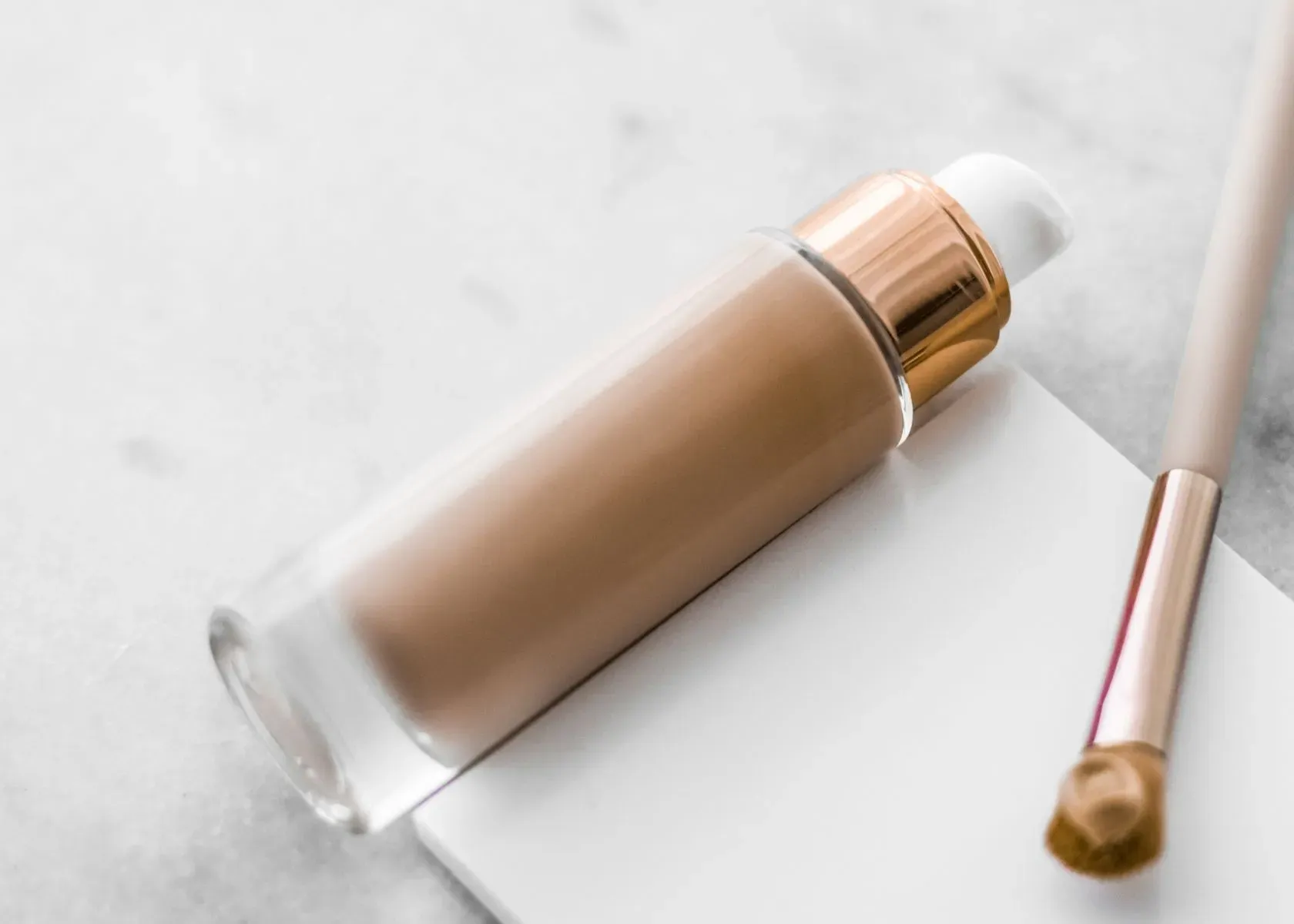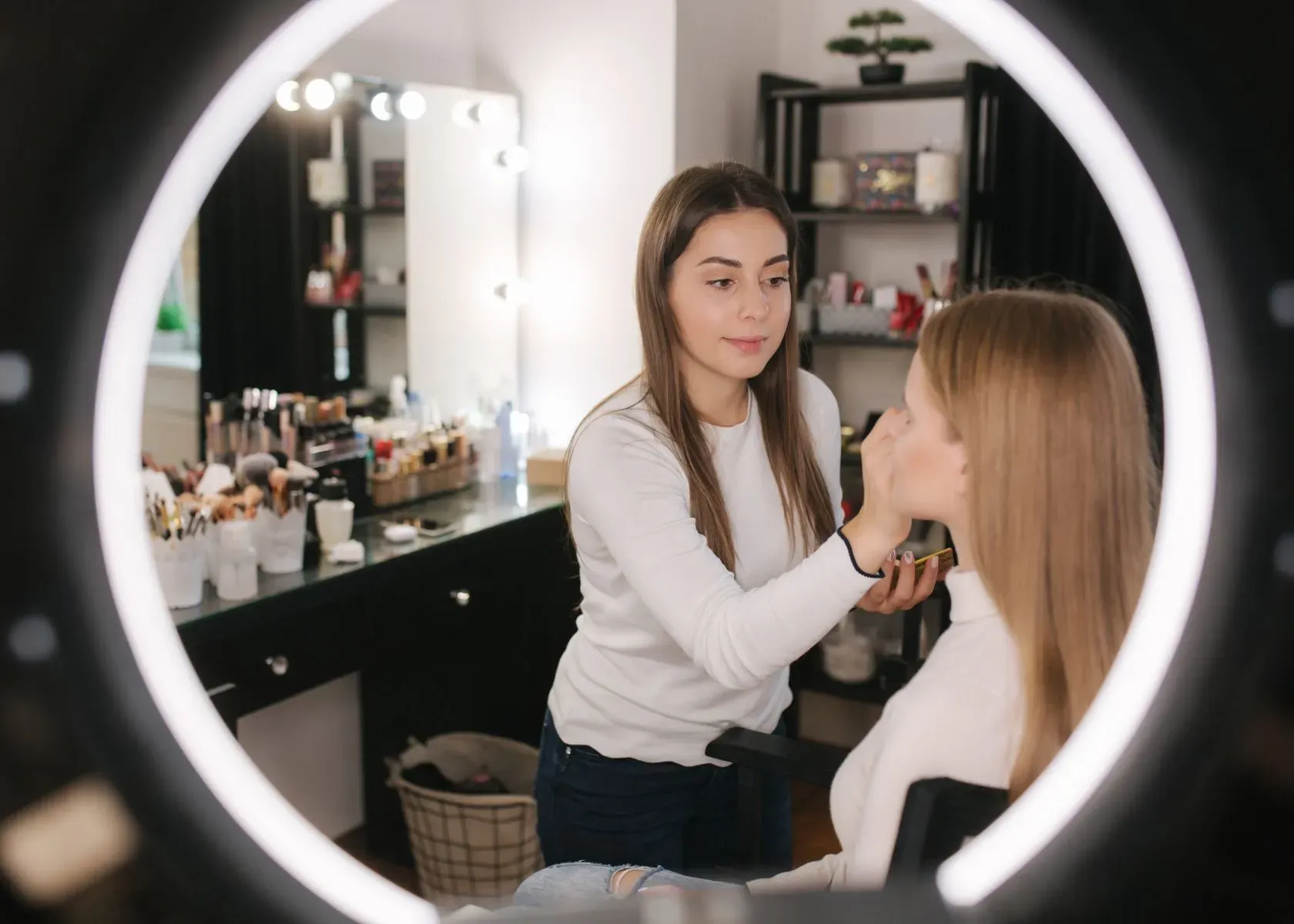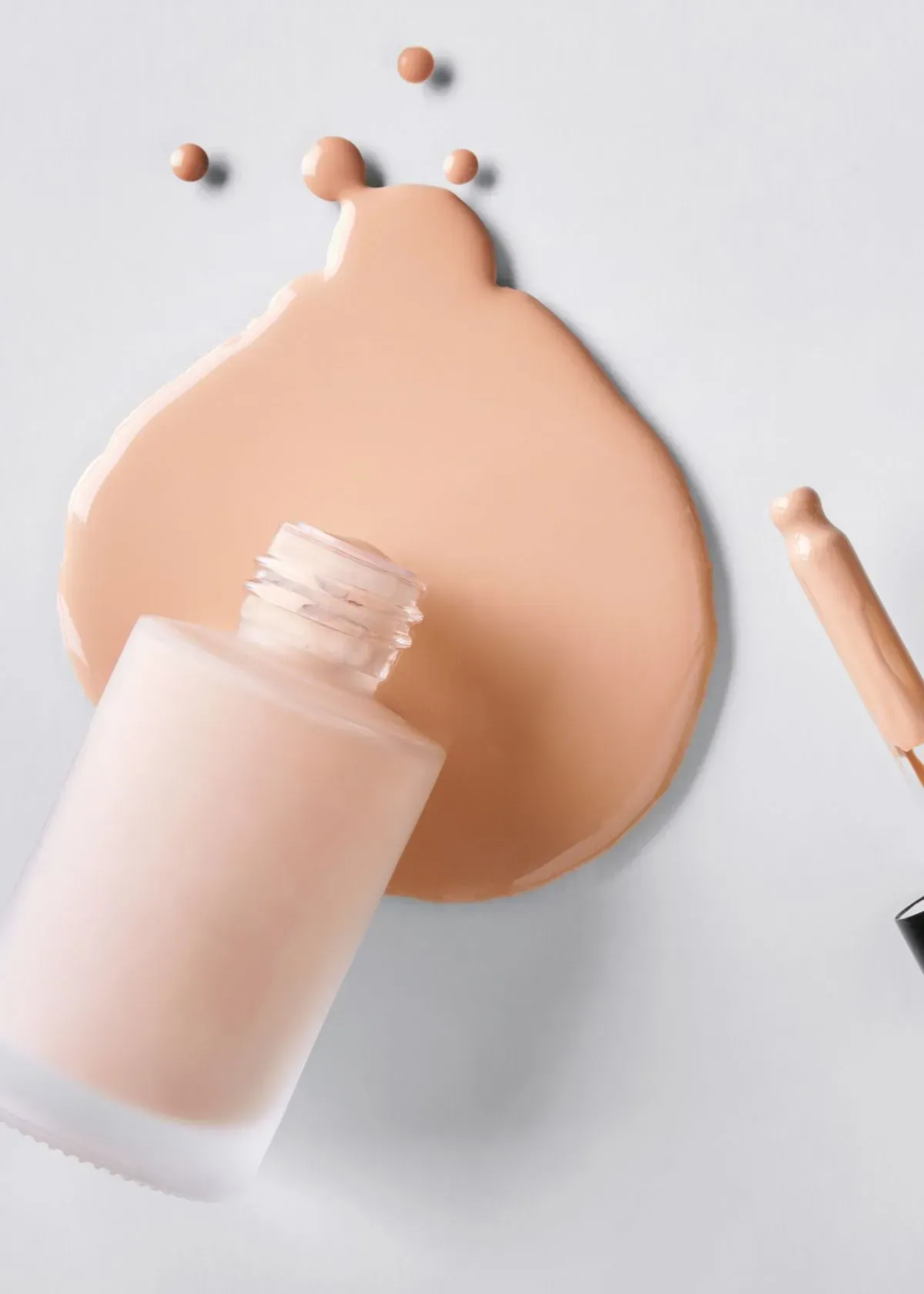Have you ever felt like your foundation and primer were squabbling siblings refusing to cooperate on your skin? Trust me, it's a common beauty conundrum that can leave even the most seasoned makeup enthusiasts scratching their heads.
The key to harmony in your base makeup isn't locked away in some high-end product; instead, it lies in understanding the chemistry of compatibility.
I've walked a mile in those unsteady makeup shoes—glancing at my reflection midday only to see my careful application betraying me. But here's the scoop: when water-based foundations enter the mix, team them up with their perfect pair—a water-based primer.
This dynamic duo works because they share the same base ingredient (hello, H2O!), making them more likely to blend seamlessly for that flawless finish we all covet.
So if you're eager for your foundation to play nice with its underlayer companion, stick around! I'm excited to guide you through selecting top-notch water-based primers designed for diverse skin types (yep, yours included).
With this little nugget of wisdom as our secret weapon, let’s step into the light of a perfectly set face. After all, who doesn't love a good glow-up?
- Water-based foundations work best with water-based primers due to their shared base ingredient (H2O), ensuring a seamless and flawless finish.
- Different skin types require specific water-based primers such as hydrating options for dry skin, oil-absorbing formulas for oily skin, and pore-minimizing solutions for combination skin.
- When selecting a water-based primer, consider your skin sensitivities, match the primer to your specific skin type, and explore budget-friendly options without compromising on quality.
Understanding Water-Based Primers

Water-based primers are formulated with water as the main ingredient, making them lightweight and hydrating for the skin. These primers create a smooth canvas for makeup application and help to prevent foundation from clinging to dry patches or settling into fine lines.
What Is a Water-Based Primer?
A water-based primer is my go-to for creating a smooth and hydrated canvas before applying foundation. It's the secret behind that perfect makeup look, working wonders to make my foundation blend seamlessly.
This type of primer has a lightweight formula that feels refreshing on my skin, unlike some heavy silicone-based options out there. I love how it helps prevent makeup from slipping or fading as the day goes by.
I've discovered that using a water-based primer like Milk Makeup's Hydro Grip Primer leaves my face with just enough tackiness to hold onto the foundation without feeling sticky. The gel formula offers an extra boost of hydration which is excellent since I want my skin to look plump and vibrant under makeup.
With this kind of lightweight primer, I know I'm providing a non-greasy base that lets my skin breathe and keeps oil at bay.
Nowadays, beauty products like E.L.F.'s Oil Control Primer Mist cater specifically to those with oily skin types looking for water-based solutions that control shine while setting their makeup in place firmly all day long.
Moving on from what defines this hydrating miracle worker, let’s delve into why choosing one can be beneficial for your beauty routine.
Benefits of Using a Water-Based Primer
Using a water-based primer offers several benefits, such as:
- It provides hydration to the skin, creating a smooth and plump base for makeup application.
- Water-based primers are lightweight and non-greasy, making them suitable for all skin types.
- They help to minimize the appearance of pores and fine lines, giving the skin a more even texture.
- Water - based primers can help control excess oil production, making them ideal for those with oily or combination skin as it contains hyaluronic acid.
- These primers increase the longevity of makeup wear, ensuring that your foundation stays in place throughout the day.
Choosing the Right Water-Based Primer

Consider skin sensitivities and allergies, match the primer to your specific skin type, look for hydrating ingredients and budget-friendly options that meet your needs.
Consider Skin Sensitivities and Allergies
When choosing a water-based primer, I always check for potential skin sensitivities and allergies. Reading the ingredient list thoroughly helps me ensure that there are no known allergens or irritants in the primer's formula.
It is important to test a small amount of the product on a patch of skin before applying it all over the skin barrier and face to avoid any adverse reactions.
Additionally, being aware of my own skin sensitivities guides me in selecting fragrance-free and hypoallergenic options, reducing the risk of any negative reactions. Remembering these considerations allows for a smooth and comfortable makeup application experience without any unwanted side effects.- Match primer to your skin type.
Match Primer to Your Skin Type
Now that we've considered skin sensitivities and allergies, it's important to match the primer to your specific skin type. For dry skin, opt for a more hydrating formula or water-based primer like GLOSSIER Priming Moisturizer or milk makeup primer, containing coconut water to ensure a smooth and moisturized base for foundation application.
Those with oily skin should look for mattifying water-based primers such as the HONEST BEAUTY Matte Everything Primer to control excess oil and prolong makeup wear. Combination skin can benefit from E.L.F.
COSMETICS Poreless Putty Primer, which helps minimize pores while hydrating dry areas. NYX professional makeup is a hydrating primer that is perfect to keep your skin hydrated.
When choosing a water-based primer, take into account any specific concerns related to your skin type. It's essential that the primer complements your unique needs, whether you have dry, oily, or combination skin.
Budget-Friendly Options
After matching the primer to your specific skin type, you can explore budget-friendly options that deliver quality results without breaking the bank. One such option is the NYX Professional Bare With Me Hydrating Jelly Primer, which provides a hydrating base for water-based foundations and is suitable for various skin types.
Its lightweight gel formula ensures easy application and long-lasting wear, making it an ideal choice for those seeking an affordable yet effective water-based primer. It also contains blue agave extract that make your makeup last for 12 hours.
Another cost-effective option to consider is the e.l.f. Cosmetics Poreless Putty Primer, known for its silky texture that blurs imperfections and creates a smooth canvas for makeup application.
Disadvantages of Using a Water-based Primer

Are you wondering, what are the disadvantages of using a water-based primer? How do you match a water-based primer with your foundation? Let's find out in this section of the blog post.
Water-based primers have their drawbacks, particularly for those with very oily skin. These primers may not control oil as effectively as silicone-based primers do. Additionally, water-based primers may not provide the same level of pore-filling or blurring effects that silicone-based options offer, potentially resulting in less smooth-looking skin.
It's important to note that some water-based primers might not hold makeup in place for extended periods compared to silicone-based formulas. They are not very effective for dry and sensitive skin types.
Furthermore, if you have dry patches on your skin, using a water-based primer having coconut water could emphasize these areas rather than smoothing them out. This can lead to an uneven application of foundation and other makeup products.
Matching Water-Based Primer with Foundation
When considering the best water-based primer to match with a foundation, it's crucial to remember that compatibility between these two products is essential for achieving a flawless makeup look.
Choosing a water-based primer that complements your water-based foundation will ensure optimal performance and longevity of your makeup.
For instance, pairing Hourglass Mineral Primer, an oil-free option, with your oil-free foundation can help create a smooth and even base without any concerns of product clashing. You can try out milk makeup primer with hyaluronic acid for better moisture instead of oil based primers. Also because of its micronized bamboo powder, it can cover all the imperfections.
As recommended by beauty experts, Milk Makeup's Hydro Grip Primer works well in tandem with water-based foundations due to its gel formula and hydrating properties. This allows for seamless application and long-lasting wear throughout the day.
Making conscientious choices when selecting both your primer and foundation can significantly impact the overall finish of your makeup – ensuring it remains radiant and blemish-free.
What Primer to Use With Water Based Foundation - FAQs
Here are some of the most commonly asked questions about water-based makeup primer choices that you have.
What kind of primer should I choose for my water-based foundation?
For your water-based foundation, you'll want to pick a lightweight makeup primer or gel formula makeup primer that is silicone-free to help create a smooth base for your makeup.
Can I use an oil-based primer with my water-based foundation?
It's best not to mix an oil-based primer with a water-based foundation; they might not blend well together. Stick with a water-based makeup primer for the best results.
Why is it important to use the right type of face primer under foundation?
Using the correct face primer under your foundation helps prepare your skin and ensures that your makeup goes on evenly and stays put longer.
What are some benefits of using a silicone-free gel formula makeup base?
A silicone free gel formula makeup base feels light on the skin, won't clog pores, and gives you a natural look while helping keep your foundation in place throughout the day.
If I want my skin to look matte, what type of primer would work best with my water based makeup?
To achieve a matte finish when using water-based makeup, go for a matte putty primer or TruBlend Base Business Primer, which will control shine without drying out your skin.
Conclusion
Water-based primers are essential for creating a flawless base when using a water-based foundation. They offer practical solutions for different skin types and cater to specific needs like hydration or oil control.
By matching the primer's base ingredients with the foundation, you can ensure efficient makeup application and long-lasting wear. Understanding the benefits and top recommendations emphasizes the importance of choosing the right primer for your skin type.
This approach can lead to significant improvements in your makeup routine by providing a non-greasy, smooth base that sets makeup in place. Explore these options to elevate your beauty regimen further.
Share your ultimate combination of primer and foundation with us in the comment section below.
References
- Lodén, M., & Maibach, H. I. (Eds.). (2010). Dry skin and moisturizers: Chemistry and function (2nd ed.). CRC Press.
- Johnson, W. (Ed.). (2007). Skin care and cosmetic ingredients dictionary (3rd ed.). Milady.
Learn More About Water-Based Foundations





